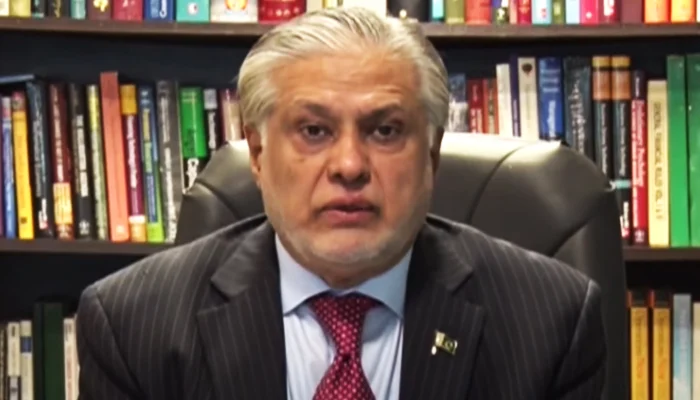- Ishaq Dar thanks “true brother” Saudi Arabia.
- Pakistan also seeks from other friendly nations.
- IMF’s board meeting to approve loan on July 12.
Finance Minister Ishaq Dar said Tuesday that Saudi Arabia deposited $2 billion in the State Bank of Pakistan (SBP) days after Islamabad reached a staff-level agreement with the International Monetary Fund (IMF) on a $3 billion Stand-By Arrangement.
“SBP has received a deposit of $2 billion from the Kingdom of Saudi Arabia,” Dar said during a press conference, adding that this inflow has increased the forex reserves held by the central bank and will accordingly be reflected in the forex reserves for the week ending July 14.
The inflows came after Islamabad signed the short-term IMF deal on June 30 under a standby arrangement that will disburse $3 billion over a nine-month period, subject to approval by the IMF’s board, which is meeting on July 12.
Multilateral and bilateral funds were a major obstacle in the way of Pakistan’s deal with the IMF — which remained stalled for more than nine months and expired.
The SBA has now provided the nation with a breathing space, avoiding a sovereign default, and helped the government streamline fiscal policies.
With sky-high inflation and foreign exchange reserves barely enough for a month of controlled imports, analysts say Pakistan’s economic crisis could have spiralled into a debt default in the absence of the IMF bailout.
Dar — on behalf of Prime Minister Shehbaz Sharif — thanked Chief of Army Staff General Asim Munir for playing his role in helping the government, while he also lavished praise on Saudi rulers for being “true brothers”.
“In the coming days, I believe that there will be more positive developments on the economic front […] we have reached stability,” the finance minister said.
After the IMF deal, Fitch credit rating agency Monday — after almost a year — upgraded Pakistan’s long-term foreign currency issuer default rating to CCC from CCC-.
Fitch said in a statement the upgrade reflected the country’s improved external liquidity and funding conditions following a SLA with the IMF, but warned that the fiscal deficit still remained wide.
With the IMF deal in place, Pakistan can now unlock other external financing.
In the plan sent to the lender, sources in the Finance Division said that Pakistan arranged $3.5 billion in bilateral funds from China, $2 billion from Saudi Arabia, and $1 from the United Arab Emirates.
On the multilateral side, Pakistan aims to secure $500 million from Asian Development Bank, $500 million from World Bank, and $3 billion from the IMF.
Fitch said local authorities expect $25 billion in gross new external financing in FY24, against $15 billion in public debt maturities, including $1 billion in bonds and $3.6 billion to multilateral creditors.
The South Asian nation has seen also seen severe political uncertainty since former prime minister Imran Khan was ousted through a no-confidence motion in April last year.
In a bid to ensure that the programme’s measures are implemented in the lead-up to the elections due in October, the lender’s team met all mainstream political parties to seek support and consensus for the SBA.
Khan’s Pakistan Tehreek-e-Insaf said he gave his support for the deal.

 Latest News2 days ago
Latest News2 days ago
 Entertainment2 days ago
Entertainment2 days ago
 Latest News2 days ago
Latest News2 days ago
 Business2 days ago
Business2 days ago
 Latest News2 days ago
Latest News2 days ago
 Latest News2 days ago
Latest News2 days ago
 Latest News2 days ago
Latest News2 days ago
 Latest News2 days ago
Latest News2 days ago























